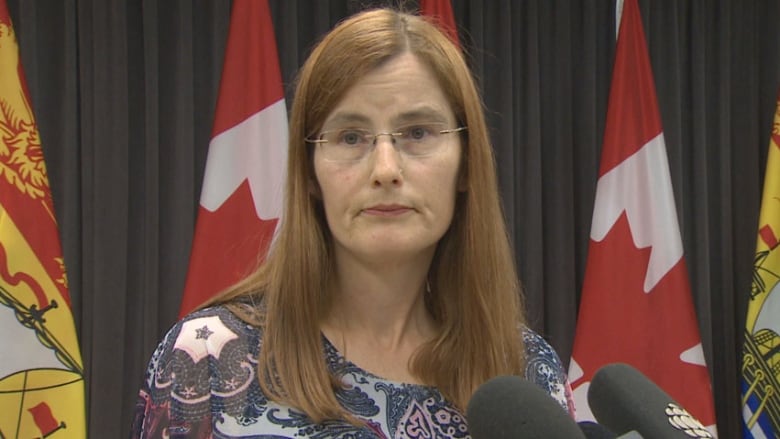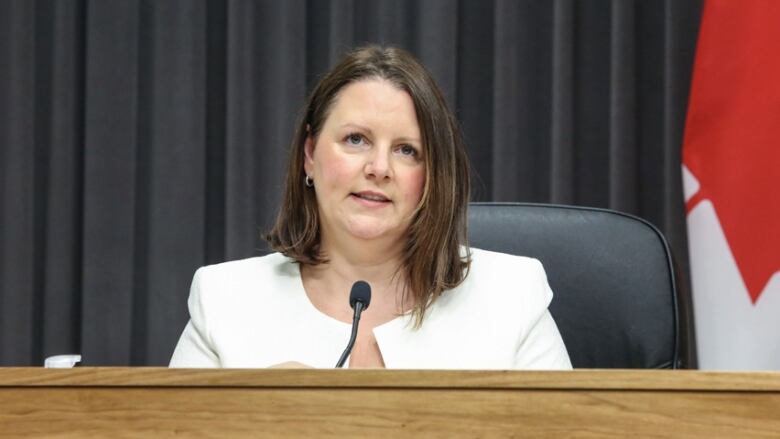Memo to health workers provides insight into COVID 'de-escalation' plan
Dr. Cristin Mueckeoutlines changes in case and contact management as province moves toward green phase

How New Brunswick will transition to the green phase of COVID-19 recovery is expected to be revealed within weeks when Public Health releases a "de-escalation" plan.
But a recent memo the deputy chief medical officer of health sent to all health-care professionals in the province provides some insight intowhat the plan might entail.
Dr. Cristin Muecke outlines"modifications" in case and contact management as New Brunswick moves alongthe path to greenin her June 24 memo, obtained by CBC News.
Contacts of contacts no longer have to isolate, according to the memo.
"Isolation and testing measures will differentially reflect full, partial or non-vaccinated status."
And "intensity of case and contact monitoring and release will be contextual and in some cases lightened based on testing results," Muecke said in the memo.
"Public Health will work with organizers/owners to support and ensure appropriate communication for moderate and lower risk exposures related to larger group settings/workplaces/public exposures."
Department of Health officials did notrespond to a request for comment.
On Wednesday, during the COVID-19 briefing,Chief Medical Officer of Health Dr. Jennifer Russell told CBC News the de-escalation plan is not finalized and she could not say when it will be released publicly.
Public Health continues to work with health-care providers on theplan, she said.
"We have reached out and met with different stakeholders so that they could understand what their involvement would be," she said, citing the New Brunswick Medical Society as an example.
Public Health's approach to case and contact management became "more conservative" during the pandemic, as risks increased, particularly with the new variants of concern, according to Muecke's memo.
Thiswas "aligned with what amounted to a COVID-19 elimination strategy."
It is expected that we will eventually reach an endemic state, where COVID-19 rates become relatively constant and predictable with manageable increases related to specific populations or seasonality.- CristinMuecke, deputy chief medical officer of health
With vaccination rates rising, the changes will be phased in between now and August, she indicated, when the province aims to haveat least 75 per cent of New Brunswickers aged 12 or older fully vaccinated.
Once thatthreshold is reached, the province will end the state of emergency mandatory order andlift all Public Health restrictions provided COVID hospitalizations remain low and all health regions remain at the yellow COVID alert level.
"As immunization rates continue to grow, the expectation is that we will reach a state during which cases will either be unlikely to face severe outcomes such as hospitalization or where transmission will be reduced (particularly as second dose coverage increases)," Muecke said in the memo.
As of Wednesday, 53.5per cent of eligible New Brunswickersare fully vaccinated and 79.9per cent have received at least one dose.

"As the province and the country reopens, it is expected that we will eventually reach an endemic state where COVID-19 rates become relatively constant and predictable with manageable increases related to specific populations or seasonality," Muecke indicated.
"It remains possible that unforeseen circumstances may modify the proposed approach, and we shall remain as flexible and adaptable as we have been in the past," she saidin the memo.
"We will need to monitor our progress carefully and likely make adjustments as we go along to ensure that we are effectively managing the risk."
The memo was also sent to the Horizon andVitalithealth networks, the New Brunswick Medical Society, the Nurses Association of New Brunswick, the New Brunswick Pharmacists' Association, the Department ofSocial Development, the College of Pharmacists, Ambulance New Brunswick, the Extra-Mural Program,the New Brunswick Health Emergency Operations Centre, and the Paramedic Association of New Brunswick.
Plan in the works
Last week, Russell revealedthe province wasworking ona de-escalation plan.
"We definitely have in mind what happens if there are new outbreaks et cetera, and how to approach that with respect to restrictions and control and containment," she told reporters during a COVID-19briefing.
The plan will detailthe province's approach to declaring outbreaks, "risk-stratifying" close contacts, testing and isolationrequirements, she said.
The evolving situation with new variants of concern and variants of interest will also be taken into consideration.
"So that work is ongoing and it will definitely play a role in our approach to going back to school in the fall."
During the transition to a new normal with COVID-19, people who are unvaccinated could face different restrictions, Russell has said.
If they are close contacts ofa positive case of COVID, for example, they would "most likely"be required to self-isolate, depending on the risk assessment by the regional medical officer.
"That's what we expect right now."
Some workplaces may continue to require masking for people who are unvaccinated, she said.












_(720p).jpg)


 OFFICIAL HD MUSIC VIDEO.jpg)
.jpg)



























































































